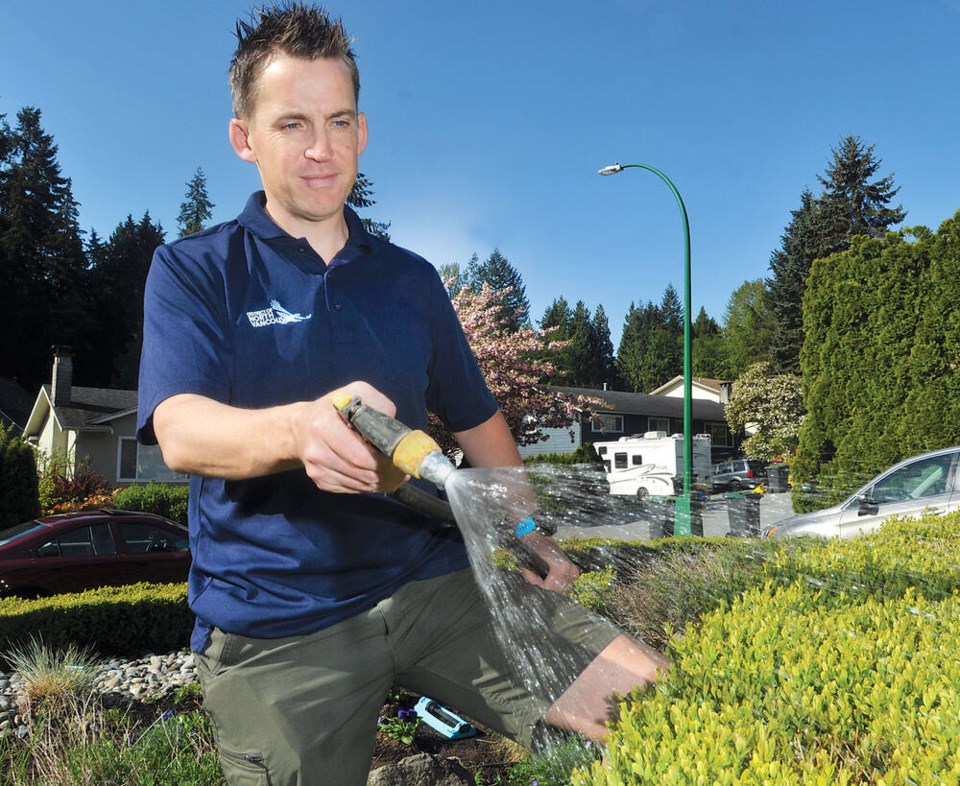The District of North Vancouver is floating the idea of requiring water meters, with the goal of reducing consumption during progressively hotter and drier summers.
On Monday, council directed staff to report back to council on opportunities to cut water usage and explore other options, including estimated costs for implementing water metering across the municipality. But during discussion, most of council seemed lukewarm on the issue due to upfront costs.
In his report to council, Coun. Jordan Back said measuring consumption is a critical part of water management systems, and that tracking usage tends to reduce it.
“As our community grows and climate change intensifies, I believe we must act proactively to ensure sustainable and fair water use,” Back said, adding that the district charges a flat fee of $901 regardless of how much a household uses.
“This is a system that doesn’t encourage conservation and is inequitable when low-usage households are supporting high usage ones,” he said.
Back pointed to other municipalities who have put mass residential metering in place, like West Vancouver in 2007 and Richmond in 2018. Water metering in West Van reduced demand by more than 40 per cent, he said.
Currently, the District of North Vancouver requires all multi-family, industrial, commercial, institutional and mixed-use buildings to be metered at the time of new construction, or with building permits with a value of $300,000 or more, Back noted in his report. New park services, such as irrigation, must be metered too.
“I want to note importantly that my motion isn’t imposing immediate implementation by any means. It’s simply asking staff to assess the feasibility, upfront cost, which we know has been a barrier, I think, for this conversation in the past, to move forward and potential benefits of introducing water metering,” he said.
Mayor skeptical on cost benefit of water meters
While supportive of the motion for more information from staff, Mayor Mike Little said he has an unpopular opinion on this issue.
“It’s not a supply problem that we have. It’s a distribution problem,” he said. “We have 25 years of growth in the Capilano reservoir right now in terms of additional water supply in that space. But by policy, we allow it to be a BC Hydro-led facility, and so the water is cast through the turbines rather than being kept for potable water supply.”
Little added that there’s not enough piping infrastructure in the southern parts of the region to supply enough water there.
“So the challenge is you have to look at whether or not there’s a real cost benefit,” he said.
According to staff estimates, adding a water meter when installing service connection on a residential house costs around $2,000, which jumps to $3,600 for retrofitting a meter to an existing home.
In this economic climate, Coun. Jim Hanson said it’s not the time to add another big fee to residents’ tax bills. But the district could introduce a charge for people with swimming pools.
“That could be introduced immediately,” he said. “There’s no cost to creating that policy, and would create a little bit more equity, because that’s obviously a discrepancy in usage – people who have larger swimming pools.”
After the discussion on metering, Hanson introduced a separate motion to have staff report back on options to encourage the use of rain barrels. Council passed that item as well.
“Summers … are getting hotter and hotter. Winters are getting wetter and wetter with more intense rain events,” he said. “Rain barrels offer the district a way to collect some of this deluge that falls in the winter and store it for use in gardens in the hot, dry days of summer.”
[email protected]
twitter.com/nick_laba
@nicklaba.bsky.social
 Want to stay updated on North Vancouver and West Vancouver news? Sign up for our free daily newsletter.
Want to stay updated on North Vancouver and West Vancouver news? Sign up for our free daily newsletter.




